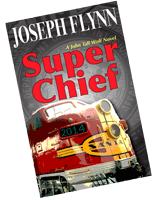Merritt Kinney thought he was going to die in his bathroom. Turned out he had the portent of mortality right and was off on the location by only one floor. The case of indigestion that had struck him was the worst he’d ever known. The agony, he felt sure, was courtesy of food poisoning from the new joint down the block.
It took all his self-restraint not to scream. Doing that might cause the downstairs neighbors to think someone was being murdered and call the cops. He decided he was going to sue the restaurant.
In a desperate attempt to divert his attention, he reached back and grabbed the book sitting atop the toilet tank: “Railroaded: The Biography of Theodore Judah.”
Judah was the visionary with the first practical plan to build a transcontinental railroad across the United States. He was undone by the corrupt merchants who funded his efforts. The money men tried to buy Judah off, but he wouldn’t play along. He boarded a ship bound for New York in 1863 to find new financial backing and expose the corruption behind the railroad’s management, but he never made it. He took ill with yellow fever in Panama and died shortly after in New York at age thirty-seven.
The swindlers, who were over-billing the federal government for every mile of track laid, went on to become some of the wealthiest and most revered men in California history.
Kinney knew all that because he’d read the book several times, always hoping for a new ending. He felt his guts spasm and tossed the book in the nearby bathtub to save it from the long-awaited vile eruption. The resulting excreta required three flushes. He felt a great relief in his midsection but was left weak in the knees.
And greatly aggrieved by the stink.
Kinney completed his business and tottered across the room to open the window and let fresh air inside. That was when he saw the car pull up to the curb across the street. Four large men in dark clothes exited the vehicle and came straight for his building.
With an intuitive certainty, Kinney knew they were coming for him. They’d soon be kicking in his door, and if they caught him, he’d die as surely and as young as Theodore Judah had. For the same reason, too. Trying to expose a great crime, but not quite succeeding.
One of the men in the street looked up and saw him in the window. Kinney retreated and grabbed his cell phone. All he could get on it was static.
Good God, were they jamming cell phone service?
It certainly wouldn’t be beyond their means.
A stop-at-nothing billionaire was behind them.
Heart pounding, Kinney fled in the only direction available to him, up one flight of stairs to the building’s roof. He tried to use his phone again, hoping to find a signal. He wanted to call the Chronicle, tell a reporter everything he knew. All he got, though, was more static.
Frantic, he ran around the perimeter of the roof, looking for an adjacent building to which he might leap. Just as he found the most likely one, the door to the roof opened and the four large men appeared. One of them held a video camera.
Their leader looked at Kinney and knew immediately what his prey had in mind. He smiled and shook his head. “I know what you’re thinking … and it only works in the movies.”
Having delivered his warning, the man took out a badge. “Just in case you’ve got the wrong idea, we’re the police, and you’re under arrest for grand larceny. We’re going to take you in and book you. All your rights will be observed.”
Kinney didn’t believe that for a minute. They might well be cops, but he’d never make it to any police station. Even so, he took three defeated steps in their direction.
Then he pivoted and with a running start jumped for the roof of the neighboring building.
He came up short. Fell four stories and died on impact.
The cop had been right. Stunts like that never worked in real life.

